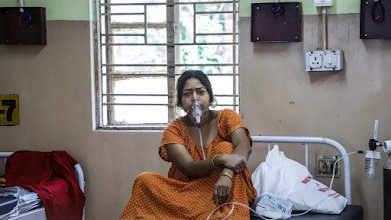Black Fungus and 2nd Spread of Covid in India
Black Fungus and 2nd Spread of Covid in India
Written By: Amritpreet Kaur

Thousands of India’s citizens have been impacted by COVID’s second wave, which began in March of this year. After a first wave starting in February of last year, the resurgence of COVID-19 cases has become especially frightening. To add to their troubles, many of those who had been affected with COVID-19 have grown increasingly susceptible to another rare infection known as the black fungus.
India had over 26 million cases of COVID-19, close to the US. Hospitals were being filled. The “Black Fungus,” scientifically known as Mucormycosis, surged through India’s progress after ending the second wave. Hospitals are being loaded, and patients are dying without their treatment. The reason why this seemingly rare disease of black fungus has started to increase seems to be an outcome of lack of treatment, leaving many patients by themselves on hospital floors. Mucormycosis, the scientific name of black fungus, is a very “serious infection that’s very difficult to treat once it’s begun to fester,” says Robert Cyril Bollinger Jr., MD, MPH, a Professor of Infectious Diseases in Baltimore. Due to both its rarity and virulence, this infection, which can target COVID-10 susceptible patients, has now caused more deaths than the deaths caused by Covid.
What is the Black Fungus exactly, and what does it affect?
The black fungus is a rare infection that was caused by the aftermath of COVID-19 patients. It affects live tissue, including the throat, the eye, nose, and ear. Mucormycosis exists in soils, compost, and organic decay all over the world.
What does Black Fungus usually attack?
Black Fungus targets people with Diabetes, people who battled with cancer that is linked with blood, including leukemia, and people with weak immune systems. People with high type 1 diabetes and type 2 diabetes will be the first affected by the black fungus.
The symptoms of black fungus usually depend on where the fungus is, whether that is in the throat, eyes, sinuses, lungs, or stomach. If it attacks the lungs, the symptoms are cough, tightness in the chest, and fever. If the black fungus attacks the skin, symptoms include sores, ulcers, and the area can turn black.
Is The Black Fungus contagious, and what caused it to target India specifically?
Mucormycosis doesn’t necessarily spread through air; it is caused by the environment, usually attacking patients with weak immune systems and Diabetes. India has the highest diabetic rates in its people, and the black fungus usually attacks it.
However, India is still trying to find out the natural causes of the black fungus and why it is targeting India right after their second wave of covid.
Work Cited
Upham, Becky. “Black Fungus and Covid-19 in India .” Everyday Health, 2021, www.everydayhealth.com/coronavirus/covid-19-and-black-fungus-things-you-need-to-know/ .
Biswas, Soutik. “Mucormycosis: The ‘black Fungus’ Maiming Covid Patients in India.” BBC News, 9 May 2021, www.bbc.com/news/world-asia-india-57027829.
Written By: Amritpreet Kaur
Thousands of India’s citizens have been impacted by COVID’s second wave, which began in March of this year. After a first wave starting in February of last year, the resurgence of COVID-19 cases has become especially frightening. To add to their troubles, many of those who had been affected with COVID-19 have grown increasingly susceptible to another rare infection known as the black fungus.
India had over 26 million cases of COVID-19, close to the US. Hospitals were being filled. The “Black Fungus,” scientifically known as Mucormycosis, surged through India’s progress after ending the second wave. Hospitals are being loaded, and patients are dying without their treatment. The reason why this seemingly rare disease of black fungus has started to increase seems to be an outcome of lack of treatment, leaving many patients by themselves on hospital floors. Mucormycosis, the scientific name of black fungus, is a very “serious infection that’s very difficult to treat once it’s begun to fester,” says Robert Cyril Bollinger Jr., MD, MPH, a Professor of Infectious Diseases in Baltimore. Due to both its rarity and virulence, this infection, which can target COVID-10 susceptible patients, has now caused more deaths than the deaths caused by Covid.
What is the Black Fungus exactly, and what does it affect?
The black fungus is a rare infection that was caused by the aftermath of COVID-19 patients. It affects live tissue, including the throat, the eye, nose, and ear. Mucormycosis exists in soils, compost, and organic decay all over the world.
What does Black Fungus usually attack?
Black Fungus targets people with Diabetes, people who battled with cancer that is linked with blood, including leukemia, and people with weak immune systems. People with high type 1 diabetes and type 2 diabetes will be the first affected by the black fungus.
The symptoms of black fungus usually depend on where the fungus is, whether that is in the throat, eyes, sinuses, lungs, or stomach. If it attacks the lungs, the symptoms are cough, tightness in the chest, and fever. If the black fungus attacks the skin, symptoms include sores, ulcers, and the area can turn black.
Is The Black Fungus contagious, and what caused it to target India specifically?
Mucormycosis doesn’t necessarily spread through air; it is caused by the environment, usually attacking patients with weak immune systems and Diabetes. India has the highest diabetic rates in its people, and the black fungus usually attacks it.
However, India is still trying to find out the natural causes of the black fungus and why it is targeting India right after their second wave of covid.
Work Cited
Upham, Becky. “Black Fungus and Covid-19 in India .” Everyday Health, 2021, www.everydayhealth.com/coronavirus/covid-19-and-black-fungus-things-you-need-to-know/ .
Biswas, Soutik. “Mucormycosis: The ‘black Fungus’ Maiming Covid Patients in India.” BBC News, 9 May 2021, www.bbc.com/news/world-asia-india-57027829.
Comments
Post a Comment